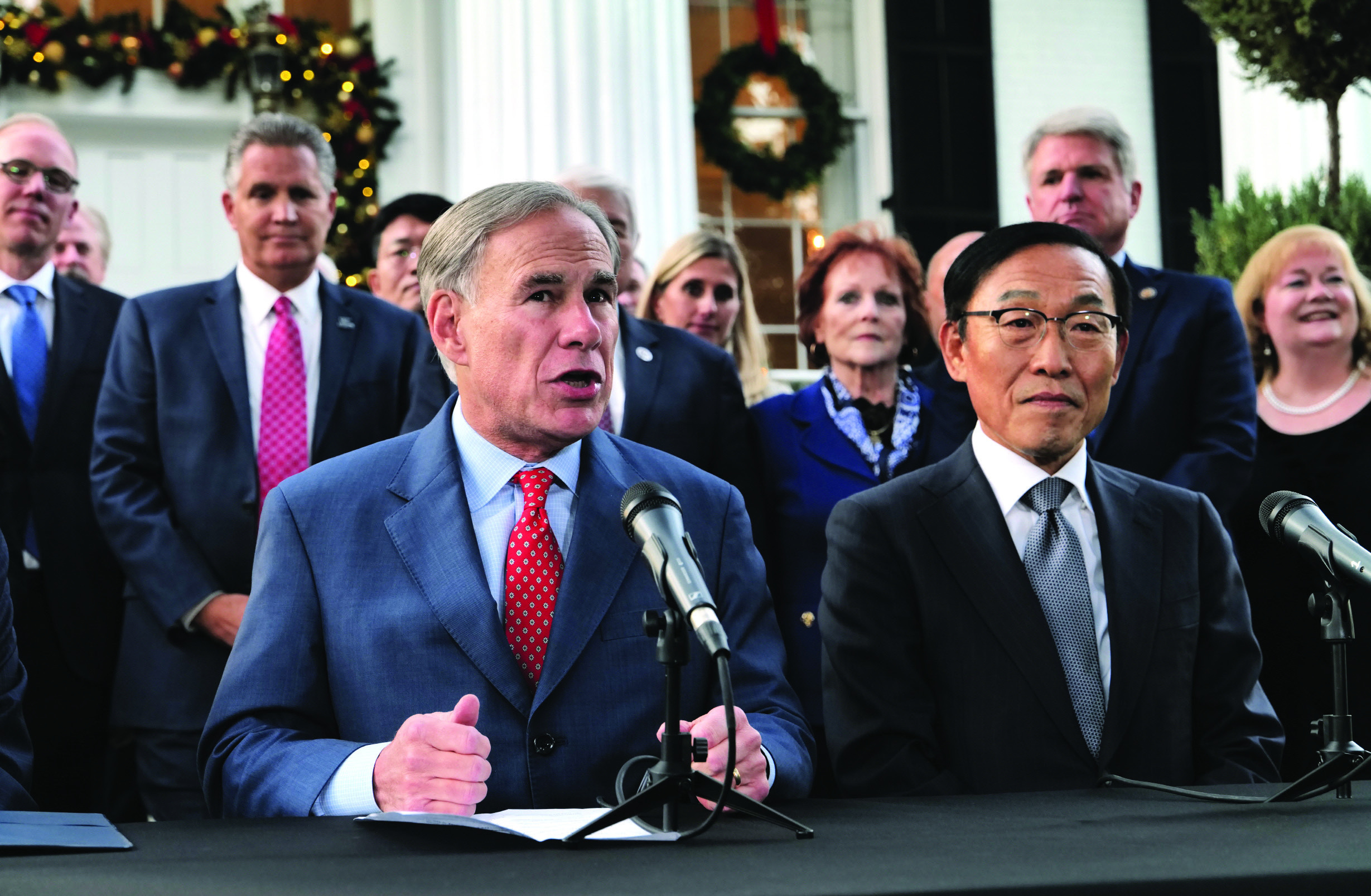Though Williamson County is surfing the wave of the future, an influx of high-tech industries has also meant construction headaches in neighborhoods, eminent domain frustrations, slowed home sales, fedup residents moving out and fears the charms of local small towns are soon a thing of the past.
For at least a few, “progress” isn’t necessarily beneficial for all.
“That’s not what I signed up for when I came out here and bought land,” said Kris Kibidoux, who purchased a quiet, rural spread in southwest Taylor now overshadowed by the booming Samsung Austin Semiconductor fabrication plant rising from the Blackland Prairie.
Taylor Mayor Brandt Rydell said even in the face of progress, steps are being taken to make sure the area retains its traditional feel.
“A lot of the planning was predicated on ensuring Taylor could maintain small-town character in the face of impending growth,” he said.
There’s no denying Dell Computer, Cypress Semiconductor, Motorola, Tesla and Samsung have all sparked a growth spurt that makes Williamson County one of the hottest spots for business in Texas, and one of the fastest-growing counties in the nation.
The 1,200-acre Samsung plant is expected to be the hub of what Forbes called “a cluster of capabilities” — supporting labs and other enterprises in the surrounding area.
Wilco’s business leaders are overwhelmingly positive about the possibilities this growth portends for the area’s future. Most residents are optimistic, too, despite the growing pains that accompany this kind of rapid expansion.

MINUS AND PLUS
But some remain skeptical and others feel disenfranchised by the direction the developments are taking.
A few have sold their places to take advantage of surging prices in the wake of the Samsung announcement to build in November 2021.
However, prices and home sales have flagged a little in the last year.
“The affordability of homes is hurting our city. The interest rates have pushed the payments up so high that a lot of first-time homeowners can’t afford the interest,” said Donna Brasfield of Brasfield Real Estate in Taylor. “We’re not seeing as much activity right now as we thought we would in homes, but I think in another year, when the Samsung plant is completely built, we will see it. We still have the small-town feel, but I think in the next five years you’ll see such a difference.”
The real-estate agent added, “The biggest majority of people aren’t selling or moving right now. They bought their places a few years ago and they’re not willing to pay the higher interest rates for a new place. They’re kind of waiting it out. But there is such a demand for rentals — there are practically none available... Samsung employees are leasing everything available. Even the motels are full.”
Brasfield said the growth has its downside, especially for those living near the new Samsung plant southwest of Taylor and just off U.S. 79.
“All the traffic coming and going, and the construction, that’s a big downfall for residential,” the real-estate agent said. “A lot of the land around Taylor has been sold — investors bought that right away. Some farmers became millionaires overnight — that is, the ones that didn’t have to deal with city zoning.”
Some residents have other reasons to want to leave. Kibidoux is among them.
His five acres on Windy Ridge Road, just a stone’s throw from Samsung, was annexed by Taylor in 2018. Zoned for agricultural use, it was designated a no growth property.
“I’ve heard some property in the area sold for $250,000 an acre after the Samsung announcement,” he said.
But there is no such market for his property, with agricultural zoning and without major utilities. Today he is among a group of Taylor-area residents, both within the city and in its extraterritorial jurisdiction, who are fighting to be free of city zoning restrictions.
“We have not received any benefits from being annexed,” he added. “We don’t have city utilities. I don’t have city water or sewer. We do have a well and our own septic, and we had to go to Oncor (utility) for electric. The roads are terrible, and our property taxes have tripled.”
On top of that, a company has used eminent domain to run a pipeline exclusively for Samsung’s use through his backyard, and has already dug it up for repair in less than a year.
“They start about 6 a.m. and go to sunset, and I’m talking about massive equipment, tires-that-are-taller-than-my-truck kind of equipment. They’re loud and continuously beeping and they shake the house,” he said.
“Now, they’re talking about putting a four-lane road from Taylor High School (adjacent to Samsung) through the base of my property, bringing traffic 700 feet from me,” Kibidoux added. “The neighbor next to me and the neighbor next to him are looking to sell. But right now, with our properties still zoned for ag use, if we want to sell to a factory that supports Samsung, they would not to be able to build on it.”
One of Kibidoux’s fellow residents who sold a home in the area last year and moved into a Taylor residential neighborhood said she and her husband are “just thrilled we got out. Every other house on that part of [CR 404/Windy Ridge] is for sale. The closer you are to Samsung, the worse it is.”
Many of the homes list for prices ranging from nearly $500,000 to more than $1 million.
THE LAWYER
Attorney Chris Johns is representing some disillusioned Taylor residents, including Kibidoux.
“Right now, a lot of my clients are looking to sell and get out. They went to Taylor because they wanted a small-town Texas way of life,” Johns said.
According to the attorney, these lands aren’t suitable for farming nor ranching; there’s lots of traffic and major infrastructure projects that affect his clients’ lives.
Adding to the mix, Johns said, are “multiple eminent-domain things going on” including a water-supply company building a 40-inch waterline through properties; a 350-foot swath of land going for the Corridor A2 county road; and a new gas line serving only Samsung.
“There are people who have multiple eminent-domain projects going through their property, and about 90% of them just take whatever offer they get for that. Most people leave a ton of money on the table in eminent-domain cases,” Johns said. “Sometimes, you could get 20 times more. I know of one crazy case involving a road where the client ended (up) getting 1,433 times the initial offer. I know a lot of people are suspicious of lawyers, but I would say they really need legal representation for the projects going on out there.”
He added, “With all this construction and roads and new pipelines, a lot of people would like to snap their fingers and get out right now. But with interest rates and the environment here, it’s harder for companies to do projects if they have to make sure they can line up water and wastewater services.”
A new law passed by the 88th Legislature allows property owner to petition a city to let them out. If the city isn’t willing to provide services and doesn’t agree to release the owner, the next step is a lawsuit.
“It’s unfortunate — government is supposed to coordinate things so people inside a city can get city services,” Johns said.
THERE IS A PLAN
Rydell said Taylor has been preparing for something like Samsung for a long time. The city’s comprehensive plan for growth was released in 2021, the week before parent company Samsung Electronics Co. Ltd. announced the South Korean giant’s plans for Taylor.
A sister plant built in 1994 is about 15 miles away in Manor.
“We didn’t envision Samsung arriving, but we knew Taylor was going to grow,” Rydell said. “A lot of the planning was predicated on ensuring Taylor could maintain small-town character in the face of impending growth. You have to look at Hutto and how it has taken off in the last couple of decades. That would be Taylor’s future.”
He added, “We said, ‘Is this the type of development we want to see in Taylor, or is there a different approach — a plan to maintain that character and connection people feel in Taylor?’” The plan, Rydell said, was meant to “promote a traditional development pattern more akin to early days, instead of the suburban pattern from the late 20th century. We were spared that … we had relatively modest growth.”
Now that Taylor is becoming a hot market, Rydell said, the plan aimed to maintain “community character and a small-town atmosphere by ensuring connection among residents. We wanted a diverse housing stock to accommodate everyone, and to make sure as we grew it would benefit all of us. It would not be growth for a certain group and others would be squeezed out.”
Johns would disagree. “There are some second-class citizens here (in Taylor); people who pay full taxes but don’t get equal services. The majority of them are not looking to stay in Taylor,” he said. “It’s not the kind of place that treats people fairly. A lot of what Taylor is has completely changed for people now that Samsung is there.”







Comment
Comments